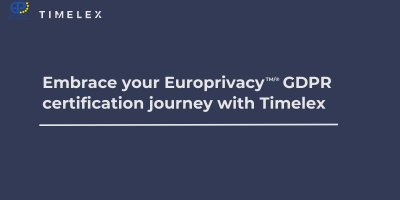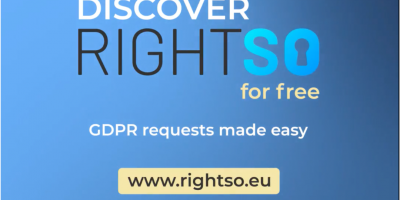Looking for?
9 legal questions when organising webinars answered
Due to Covid-19, we have massively replaced physical events with webinars. But what are the legal points of attention you need to pay attention to as an organiser? The most pressing legal questions are answered below.
1. How will I invite participants to the webinar?
First of all, there is the question of how you are going to invite participants to the webinar. Will you do this via a bulk e-mail, a personal invitation or a public announcement after which people can register themselves?
Bulk invitations | If you send invitations by bulk e-mail (e.g. via a tool such as MailChimp), then this is considered a direct marketing e-mail for which you require, in principle, the prior consent (opt-in) of the recipient. This consent needs to be free, specific and informed. You cannot send an e-mail to ask for this prior consent (because that is also considered a marketing e-mail). |
Personal invitation | If you send personal invitations by e-mail (i.e. not in bulk), you do not need the prior consent of the recipient. |
Registration | It is also possible to announce the webinar on your website or social media channel and then have participants register themselves via an online form or by sending an e-mail to a specific e-mail address. |
2. Who am I going to invite to the webinar?
It is also important who you are going to invite. Are you going to invite existing customers or prospects? As mentioned above, sending an invitation to a webinar by bulk e-mail is a direct marketing e-mail for which you need prior consent (opt-in), unless you can invoke the soft opt-in exception. Whether that is possible in your case also depends on who you are going to invite: existing customers or prospects?
Existing customers | If you are going to invite existing customers (i.e. persons with whom you have a contractual relationship by virtue of having already purchased products or services) by bulk e-mail, then you do not need to obtain prior consent if the webinar is about products or services similar to those the customer has previously purchased or received and provided that the customer has been given the opportunity to opt-out of receiving marketing e-mails (soft opt-in). For professional webinar organisers for whom the participation in the webinar constitutes the service in itself (e.g. a publishing company organising online legal training), participants in a previous webinar may also be considered as “existing customers”. This means that the soft opt-in could possibly be applied, as the invitation to another webinar could probably be considered as a similar service. |
Prospects | Prospects are potential customers who have not yet bought or used any products or services. With prospects, there is thus no (previous) contractual relationship, unlike with existing customers. Can you then invoke the soft opt-in for prospects (so that you do not need permission to send direct marketing e-mails)? The law states that the data must have been obtained “in the course of the sale of a product or a service” (free translation) in order to invoke the soft opt-in. The question is how this should be interpreted.
|
3. Can I send participants marketing emails after the webinar?
In principle, this is not allowed without their prior consent (opt-in). It is not the intention that you use the e-mail addresses of participants for sending marketing e-mails without having obtained free, specific and informed consent from the participants (e.g. at registration).
You can obtain this consent during registration. Please note that the checkbox should not be checked by default in order to speak of valid consent. Of course, the general rules for sending marketing e-mails also remain applicable (e.g. the possibility of unsubscribing in every e-mail).
4. What do I need to inform webinar participants about?
When organising (and possibly recording) a webinar, you process personal data in the context of their participation in the webinar. You will probably process at least name and e-mail address, but perhaps also their profession or other data in the context of a recording of the webinar.
You must inform participants in accordance with Article 13 of the GDPR which means, among other things, that you must say:
- Who is responsible,
- What data you process and for how long,
- What the purpose of the processing is,
- What the legal basis is,
- Whether the data will leave the EEA,
- With whom you will share the data (i.e. categories of recipients),
- What rights participants have and how they can make a request,
- That participants have the right to complain to the data protection authority.
5. How should I inform webinar participants?
How best to inform participants also depends on how you have invited participants (see question 1). If you have invited participants by e-mail (whether or not in bulk), you can already provide the necessary information in this e-mail. If participants have to register themselves via an online form, you can include the necessary information in the form and in the confirmation e-mail after registration.
6. What arrangements do I make with a speaker?
If you are going to invite an external speaker to speak during the webinar, it is best to make clear agreements about the slides, confidential information and sharing data about participants with the speaker.
Copyright on slides | The slides of an external speaker may be protected by copyright, but this copyright remains with the speaker if you do not make any other agreements about this. This means that you cannot simply distribute these slides further, not even in the context of a recording of the webinar (see questions 7 and 8). |
Confidential information | It is possible that the speaker wishes to share information with the audience that should not be distributed further (e.g. via a recording of the webinar). It is best to make arrangements with the speaker about the recording and distribution of the webinar, so that the speaker can decide for himself what information to share with the public. |
Participant data | In some cases, participants' data are shared with speakers (e.g. contact details). In this context, the speaker may use these data for his own purposes (e.g. by contacting participants afterwards), thus becoming a data controller. As the data controller, the speaker should inform the participants about this processing, but he or she can provide this information via the organiser of the webinar. In that case, the speaker and organiser should draw up a data sharing agreement. Moreover, in this case the organiser must inform the participant about the sharing of their personal data with the speaker. |
7. Can I share data from webinar participants?
If you have obtained data in the context of the webinar (e.g. contact details or employer of the participant), can you share this data with others?
Sharing with the Speaker | For the speaker, it is useful to know in advance who will participate in the webinar (e.g. how many participants, from which sectors, etc.). If this data is shared by the webinar organiser with an external speaker (i.e. a recipient), there should be a legal basis for sharing this data. As the sharing of these data is likely to be within the reasonable expectations of the participants, the ‘legitimate interest’ basis is one of the possibilities. This means that it would not be necessary to ask the participants’ permission to share certain data with the external speaker. Certain types of webinars may even require the sharing of personal data with the speaker (e.g. an interactive webinar). In this case, the sharing of such personal data could possibly be based on the ‘contract’ ground rather than the ‘legitimate interest’ ground, as this is required by the nature of the webinar. In addition, the participants must in any case be informed about this (category of) recipient (see question 4 above). |
Sharing with other parties | If the personal data are shared with other recipients than the external speaker, this may not be part of the reasonable expectations of the participants and the ‘legitimate interest’ principle is therefore more difficult to apply. Which basis is appropriate depends on the type of recipient (e.g. a platform hosting the webinar, or other commercial companies? ). If the data is passed on as leads to other companies, the consent of the participants may need to be sought. Also in this case, the participants should at least be informed about the sharing of their data with this (category) of recipient (see question 4 above). |
8. Can the webinar be recorded?
Regarding the recording of the webinar, a distinction must be made between a recording by the organiser or by a participant.
Recording by organiser | The organiser can record the webinar, but depending on the personal data that will be included in the recording (e.g. images, audio, questions in the public chat, etc.), the organiser needs to inform the participants beforehand. It is best to do this at the time of registration, especially if it is a paid webinar. People who do not agree with the recording can then decide not to register. You can also inform participants at the start of the webinar before you start recording. People who do not agree with a recording can then leave the webinar. Then you can start the recording and repeat that the webinar is being recorded, so that later you also have proof that everyone who is participating has agreed to the recording. It is also best to inform participants about the specific data that will be recorded. It is possible that the name of the person asking the question will also be recorded (in the public chat). If this is the case, you could also provide an alternative method of asking questions (e.g. by sending an e-mail message to the host, or by making names invisible in the public chat). |
Recording by participants | It is also possible that a participant records the webinar himself. If such recordings are not prohibited by the organiser, it is not prohibited for the participant to make a recording and use it for his/her own purposes as long as the participant does not thereby infringe any other legislation (e.g. copyright of the speaker). The organiser may prohibit the recording of the webinar by participants by including it in terms and conditions of participation in the webinar to which the participants agreed upon registration. |
9. Can I post the recorded webinar online?
If you are planning to put the webinar online as an organiser, you should also inform the participants about this. If you are working with an external speaker, make sure you have made arrangements for this. Also consider the following questions: will the webinar be publicly available, or only for paying members? And how long will the webinar be available online?
Before you record the webinar and post it online, you should ask yourself whether this might have an impact on your future webinars. If you do this, it could mean that fewer people will participate in the live webinar in the future.
10. Bonus: which tool do I use?
In addition to legal questions, the practical question arises of how to organise the webinar. There are many different tools on the market to organise webinars (think of Zoom, Teams, Webex, GoToMeeting, etc.).
Some tools are completely free, while others have limitations for the free variant (e.g. limited meeting time or limited functions). Some tools are paid and offer more possibilities. Which tool is right for your webinar therefore depends on your budget, but also on what you want to achieve with the webinar.
Think carefully about the following:
- Who is the target group of the webinar?
- How can participants register?
- Is it a paid or free webinar?
- If it is paid, how will you process the payments?
- How interactive should the webinar be?
- Should participants be able to ask questions via the tool?
- Will the tool save these questions?
- Who will lead the webinar?
- Will you use external speakers?
- Do you want to record the webinar?
- Should participants turn their cameras off or on?
- How does the tool secure participants' data?
- Is the data of participants transferred outside the EEA?
- Will you ask participants for feedback after the webinar?
- ...
Once you have chosen a tool, it is advisable to test it thoroughly beforehand (e.g. with a colleague or with the external speaker). It is also best to provide a telephone number that participants can call in case of technical problems (e.g. no sound, no image, problems with logging in, etc.).
Do you have any questions and would you like an introductory meeting? Book a free 15-minute call with Bernd at bernd.lawyer.brussels (reserved for organisations).








